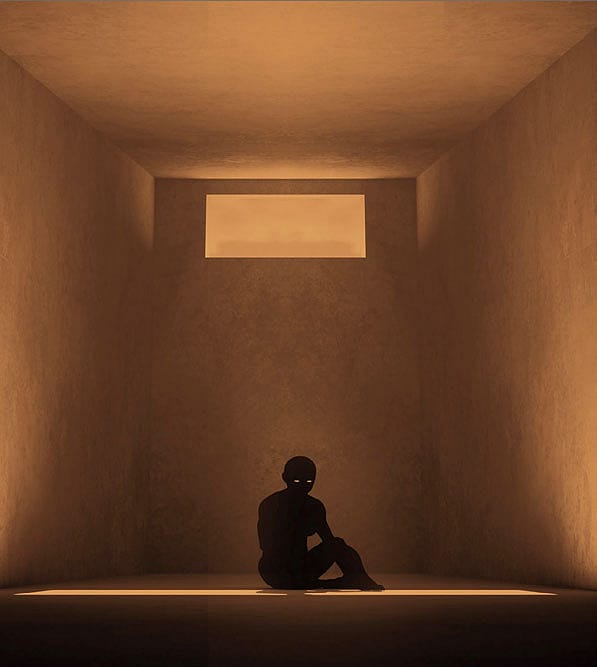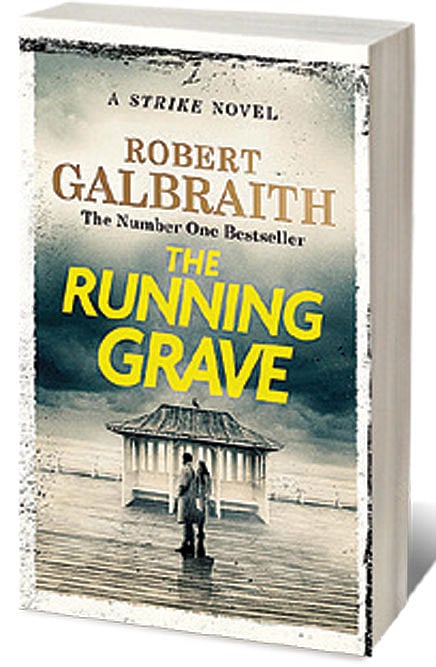Innocence versus Evil

THE SEVENTH BOOK The Running Grave (Sphere; 960 pages; ₹999) in the ongoing saga of Robert Galbraith’s series with gumshoe detective Cormoran Strike and Robin Ellacott, his detective partner (but both want it to be more and haven’t told each other), is another massive tome. But what an immersive reading experience it is. For those who don’t yet know, Galbraith (the pseudonym of JK Rowling) is truly a masterful storyteller who takes us through a rich and emotionally luxuriant landscape where yet again, innocence fights evil.
The title comes from a Dylan Thomas poem: “When, like a running grave, time tracks you down…” And a fitting epitaph to sum up the book is provided by the I Ching: “It took a long time for things to go so far. It came about because things that should have been stopped were not stopped soon enough.”
Strike and Robin are hired by Sir Colin Edensor whose son, Will, has joined a cult, the Universal Humanitarian Church (UHC) and lives off the grid in their Norfolk headquarters, Chapman Farm. Will refuses to meet his family, and has withdrawn large sums from his Trust Fund to donate to the cult. Sir Colin is in touch with a former cult member, Kevin, who is writing a tell-all expose that highlights the paedophilic behaviour of the cult principals. Chapman Farm was home to an earlier infamous Aylmerton commune where Strike’s mother had taken him and his sister for six months during their peripatetic childhood. He had been too little to remember much, but his older half-sister may not have been so lucky—that he finds out in the initial part of the book. The girls, ‘always girls’ were never safe, his sister tells Strike.
Imran Khan: Pakistan’s Prisoner
27 Feb 2026 - Vol 04 | Issue 60
The descent and despair of Imran Khan
The agency’s job is to track down those former members and others Kevin mentions in his manuscript who could be persuaded to talk or even to testify about coercion and mind control by Jonathan Wace, the charismatic UHC founder. They are asked to find some wrongdoing on the part of the cult leaders that might shore up a legal case, and at a bare minimum, provide leverage to persuade the UHC to let Sir Colin see Will again.
Robin goes undercover and joins the cult. She has to leave all her belongings behind, and has no phone, watch or credit cards. All her access to the outside world, and to the world of time, television, and technology, is cut-off. By previous arrangement, she communicates every week with the agency by leaving a letter under a rock in a camera-free blind spot by the barbed-wire fence. Initially, she doesn’t discover much. The place is run by Wace’s wife, Mama Mazu, whose description evokes evil: “very dark narrow eyes…strange lopsided stare…and for reasons Robin couldn’t have explained, a tremor passed through her, such as she might have experienced something pale and slimy watching her from the depths of a rock pool.” Robin tries to connect with the surly Will who has been demoted to farm jobs and other manual labour—a sure sign of his disgrace.
Kevin is shot dead and with drugs found in the flat, his murder is attributed to a drug gang. Meanwhile Robin meets his two sisters and mother who have remained in the cult; the eldest, Becca, being the Founder’s blue-eyed girl. Soon Robin begins to lose track of time and her own sense of agency, and finds herself chanting under her breath. She witnesses the leaders levitating, sees the apparition of a young girl (the Drowned Prophet) who drowned many years ago, and other ‘miracles’ that enthral and subdue the members into captive submission.
On the outside, Strike tracks down former cult members including Wace’s eldest daughter, Abigail, who left the commune at the age of 16 and is now a fireperson. While the other members of his team carry on with their more humdrum assignments—an actress who is being stalked, a cheating husband, a toy boy who may be unfaithful—Strike also has to tackle the odd behaviour of a silent new staff member. These diverse threads are woven together in the narrative with satisfying clarity at the end, which speaks to Galbraith’s skill as a storyteller.
In the earlier books, there was the ‘will they realise they love each other’ motif threading through. Robin came to realise it in the previous book, and in this one it is Strike’s turn. “So here stood Cormoran Strike, slimmer, fitter, clearer of lung, alone in his attic, poking broccoli angrily with a wooden spoon, thinking about not thinking about Robin Ellacott.” Robin has a boyfriend, a handsome policeman who makes Strike gnash his teeth and pray that they break up.
The theme of this book, like the earlier ones, is about how to tackle evil especially when obsessions by the naive perpetuate such evil. In Career of Evil, the serial killer had no redeeming qualities and simply blundered down a predetermined path created in the killer’s childhood. Lethal White, focused on intentionality, where the choice to be better or worse, to commit or refrain from doing an evil act rests with each individual. In The Running Grave, evil acquires more shades, especially when the naive are trapped in its coils. Will and Strike’s mother (Leda) are the innocents who don’t see evil. Either it is theoretical (for Will) or it is a naive conviction that genuine evil was found only in the repressions of small-town respectability (Leda). Hannah Arendt’s famous phrase, “the banality of evil” to describe the Nazis and the ordinary Germans who followed Nazi orders can be applied to the cult members who find themselves complicit in UHC’s crimes.
Strike bemoans: “Too many people…especially intelligent ones presume innocence when they meet weirdness. ‘Bit odd, but I mustn’t let my prejudices cloud my judgment.’ Then they over-correct, and what d’you get? A kid disappears off the face of the earth, and the whole story is bloody odd, but the robes and mystic bullshit get in the way, and nobody wants to look like a bigot….”
Questions relating to free will, the power to choose, and how to stop obsessions run through the book. The Running Grave poses the question: To what extent can we allow free choice by other human beings when it brings harm to them and others? It also continues with a question from Troubled Blood: how do we prevent herd mentality from destroying individuality? Troubled Blood skilfully tackled the issue of online bullying by fandom, and focused on the misunderstood and ill-treated young who retreat into online avatars in the anonymity of the digital space, and the impact on their confidence and individuality. In The Running Grave, through Robin’s undercover experience of the cult, we see how a regulated and repressive ‘bubble’ existence created by evil leaders in conjunction with a herd mentality can erode the sense of confidence and agency that carries us through our daily lives. Technology and its addictiveness were tackled in Troubled Blood, while in this one the obsession with a luddite existence (a tech-free one) in a cult comes with its own problems, a far cry from a carefree and pastoral idyll.
Ultimately, Galbraith reiterates a point made in earlier books: that when an individual (the UHC leaders) intentionally chooses to commit evil, then such a person is truly beyond redemption. Robin and Strike hold the moral equilibrium of the story—they are our guiding north stars. For Strike, truth is sacrosanct, and justice is the only other value he holds as high.
Most modern crime writers hasten the pace by dialling up the protagonist’s experiences to a breathless speed. But there is much to be said for Galbraith’s old-fashioned technique: allowing the reader a leisurely entry into the messy lives of Strike and Robin, giving us their routines, the dead ends, the poor personal choices (Strike hooks up briefly with Bijou, a lawyer who likes to broadcast her conquests), and through simply telling (rather than constantly showing) us what we need to know.
The Running Grave combines the best qualities of Galbraith’s previous books: a tension-packed pace, emotional intensity, and a story rhythm that ensures our readerly interest never flags. Truly an immersive and satisfying read.

